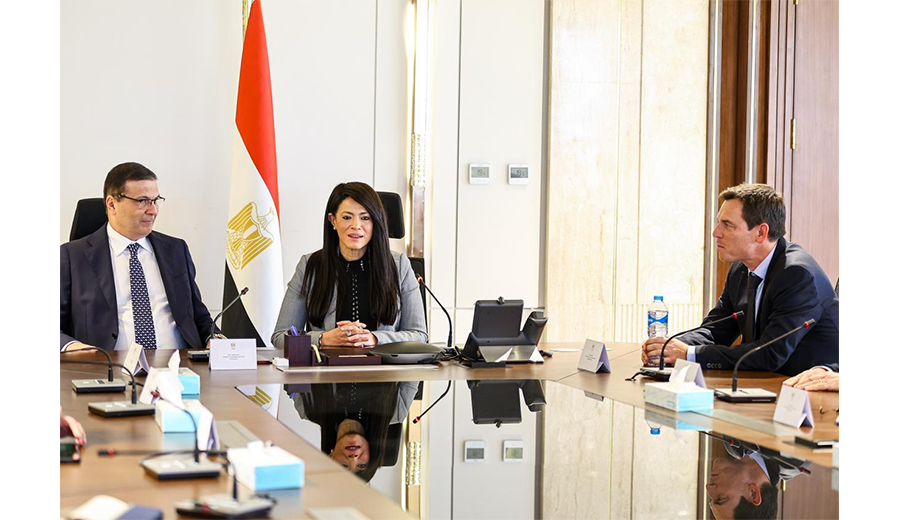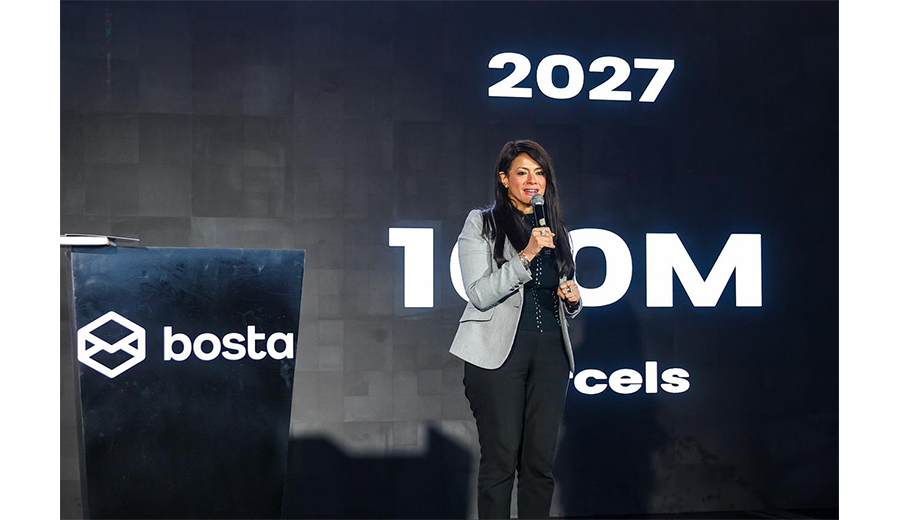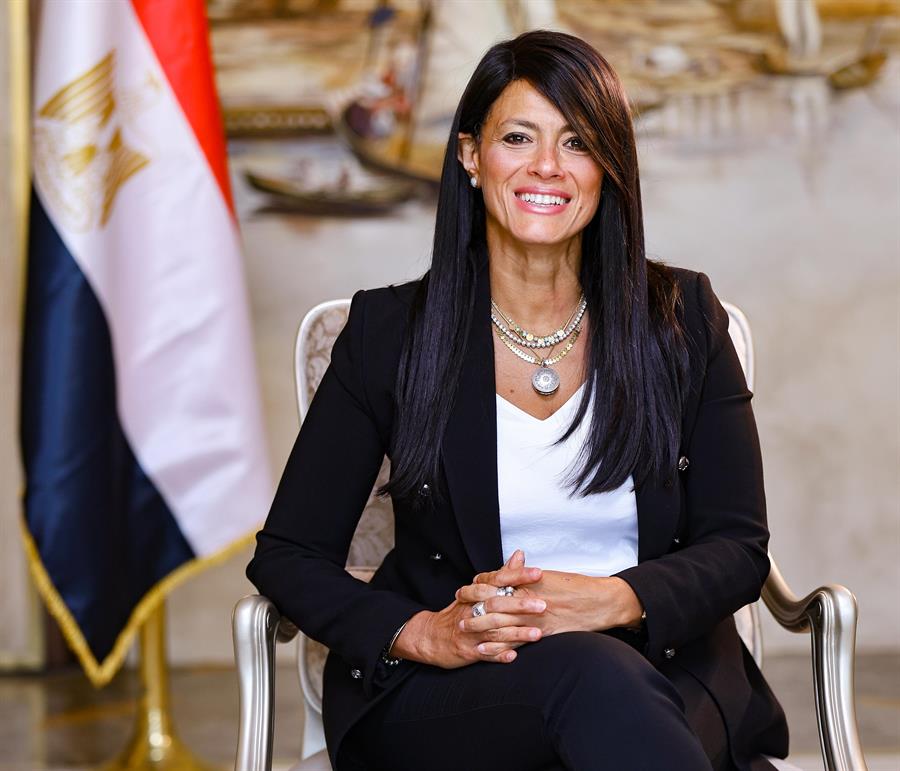Ministers of "Planning, Economic Development, and International Cooperation" and "Culture" and the Japanese Ambassador Witness the Signing of the Executive Agreement for the Egyptian Opera House Development Project
26 January 2025
Dr. Rania Al-Mashat:The agreement enhances the operational efficiency of the Egyptian Opera House while preserving its role as a beacon of arts, music, thought, and knowledge.
We highly value the strategic partnership with Japan and its role in supporting Egypt's economic development efforts across many sectors over the past 70 years.
Minister of Culture: The project contributes to preserving our rich cultural heritage... We continue to promote a thriving cultural system that not only celebrates the past but also looks forward to the future with hope and determination.
H.E. Dr. Rania A. Al-Mashat, Minister of Planning, Economic
Development, and International Cooperation, Dr. Ahmed Hanno, Minister of
Culture, and Ambassador Iwai Fumio, Japanese Ambassador to Egypt, witnessed the
signing of the executive agreement for the grant of the National Cultural
Center (Egyptian Opera House) Development Project.
The signing took place in the presence of Dr. Lamia Zayed,
Head of the Egyptian Opera House, and Mr. Kato Ken, Chief Representative of
JICA Egypt Office.
The grant, valued at 180 million Japanese yen (approximately
1.17 million USD), aims to improve the infrastructure of the National Cultural
Center by upgrading equipment and services, enhancing the main theater hall,
and supplying 20 mobile stage platforms similar to those used at the Opera
House.
This project is a joint effort between the National Cultural
Center, the Ministry of Culture, and the Japan International Cooperation Agency
(JICA).
In her speech, H.E. Dr. Rania Al-Mashat emphasized that
today’s celebration marks a significant milestone in Egypt's historic
partnership with Japan. A partnership that began in 1954 and has flourished
over decades based on mutual respect, shared aspirations, and a strong
commitment to sustainable development and cultural dialogue.
H.E. Minister Al-Mashat highlighted Japan’s contribution to
the establishment of the Grand Egyptian Museum, which serves as a cultural
beacon for Egypt and the world.
The Minister of Planning and Economic Development stated
that Egyptian-Japanese cooperation spans various fields and is reflected in
tangible achievements across multiple sectors.
H.E. Dr. Al-Mashat pointed out that the
"Egyptian-Japanese Cooperation Portfolio" highlights the alignment
between "Egypt’s Vision 2030," the "Government’s Work Program
(2024-2027)," and Japan’s development priorities.
H.E. Minister Al-Mashat also emphasized that Japan has
provided exceptional support to Egypt over seven decades through development
cooperation efforts.
H.E. Dr. Al-Mashat confirmed that the ministry has worked
diligently to strengthen and expand this partnership, citing her visit to Japan
last December, which reaffirmed the strength of bilateral relations. During the
visit, three memoranda of understanding were signed, including one for the
grant to develop the National Cultural Center’s facilities.
H.E. Dr. Al-Mashat further explained that the agreement aims
to enhance the operational efficiency of the Egyptian Opera House while
maintaining its role as a beacon of arts, music, thought, and knowledge. It
also includes upgrading the National Cultural Center with modern systems,
reinforcing its position as the leading cultural and artistic institution in
the Middle East and Africa.
H.E. Minister Al-Mashat added that the signing of this
agreement is not only a step to preserve the Opera House’s standing but also a
celebration of a rich legacy of cooperation extending over 70 years to build a
future where culture and arts continue to flourish, with Japan remaining a
close partner in Egypt's developmental journey.
For his part, Dr. Ahmed Hanno, Minister of Culture, stated
that the Japanese grant agreement aims to improve the equipment of the National
Cultural Center (Egyptian Opera House). He noted that the project is a
significant step in the ongoing efforts to enhance Egypt’s cultural landscape
and provide an environment that supports creativity, innovation, and artistic
expression.
The Minister of Culture added that the Egyptian Opera House
has long been a symbol of artistic excellence, serving as a platform for both
local and international artists. In addition to its role as a national cultural
center, the Opera House also represents the deep cultural ties between Egypt
and Japan. He affirmed that the grant agreement is a testament to the ongoing
collaboration between Egypt and its partners, whose support is vital for the
success of this endeavor.
Minister Hanno stated that the project helps preserve
Egypt's rich cultural heritage while embracing the future with modern tools and
techniques that foster innovation in the arts. He expressed appreciation to the
partners for their contributions and reaffirmed the ministry's commitment to
further enhancing the thriving cultural system, which not only celebrates the
past but also looks to the future with hope and determination.
Ambassador Iwai Fumio, Japan’s Ambassador to Cairo, remarked
that today’s agreement is a continuation of Japan's efforts to develop the
Egyptian Opera House and deepen Egyptian-Japanese relations, and strengthening
the strategic partnership between the two countries across various sectors of
development.
Mr. Kato Ken, Representative of the Japan International
Cooperation Agency (JICA), expressed his pleasure at the signing of the
agreement, which coincides with the 70th anniversary of Egyptian-Japanese
development cooperation. He called it a sign of trust in the enduring
friendship between the two countries. He also extended thanks to H.E. Dr. Rania
Al-Mashat, Minister of Planning and Economic Development and International
Cooperation, for her efforts in finalizing the agreement, which reflects JICA’s
commitment to promoting culture, creativity, arts, and education as key
components of development.









